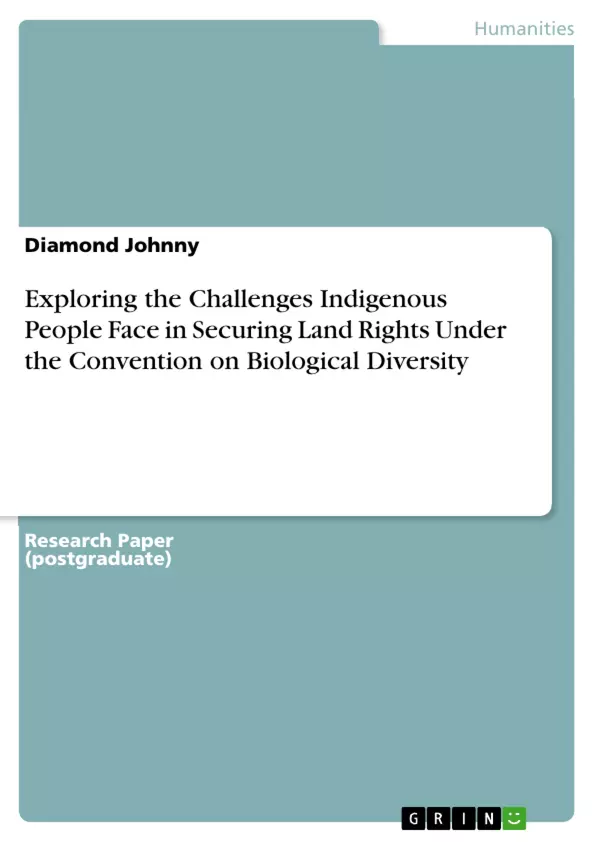This paper highlights the crucial issue of land rights for Indigenous peoples within the Convention on Biological Diversity scope and its consequential impact on biodiversity conservation and the protection of traditional knowledge systems. Indigenous communities, inherent stewards of richly biodiverse territories, have struggled amidst inadequate legal recognition to secure land rights, which poses risks to their cultural heritage and the success of global conservation initiatives. Despite acknowledging their roles by the CBD, these communities often confront substantial barriers to legitimizing land rights. This paper posits that integrating Indigenous methodologies, which include traditional ecological knowledge, community-based conservation practices, and sustainable resource management, into formal conservation programs bolstered by robust policy frameworks can lead to significant advancements in conserving biodiversity. By examining case studies and academic analyses, this discourse will illustrate the empowerment of Indigenous peoples and the enhancements that result in biodiversity conservation efficacy. By unearthing Indigenous peoples' multifaceted adversities in claiming land rights under the CBD and presenting feasible intercessions, this paper seeks to express the indispensability of embedding Indigenous perspectives into conservation efforts. This action is paramount for securing Indigenous land rights and reinforcing their indispensable contributions to preserving global biodiversity.
Inhaltsverzeichnis (Table of Contents)
- Abstract
- Introduction
- Challenges Faced by Indigenous Peoples in Securing Land Rights
- Solutions: Combining Traditional Ecological Knowledge with Contemporary Conservation Strategies
Zielsetzung und Themenschwerpunkte (Objectives and Key Themes)
This paper aims to explore the challenges Indigenous peoples face in securing land rights under the Convention on Biological Diversity (CBD) and to propose solutions that support their land rights for biodiversity conservation. It examines the impact of inadequate legal recognition of Indigenous land rights on biodiversity and cultural heritage.
- Challenges to Indigenous land rights within the CBD framework.
- The importance of traditional ecological knowledge in biodiversity conservation.
- The need for robust policy frameworks to support Indigenous land rights.
- The impact of historical marginalization and exclusion of Indigenous peoples from decision-making processes.
- The role of integrating Indigenous methodologies into formal conservation programs.
Zusammenfassung der Kapitel (Chapter Summaries)
Abstract: This abstract introduces the paper's central theme: the critical issue of Indigenous land rights within the CBD framework and its implications for biodiversity conservation and the protection of traditional knowledge systems. It highlights the challenges faced by Indigenous communities and proposes integrating Indigenous methodologies into conservation programs.
Introduction: This section introduces the vital role of Indigenous peoples in global biodiversity conservation and the urgent need to address their land rights within the CBD framework. It outlines the paper's focus on the complexities hindering Indigenous peoples from effectively asserting their land rights and proposes solutions combining traditional ecological knowledge and contemporary conservation strategies.
Challenges Faced by Indigenous Peoples in Securing Land Rights: This section details the obstacles faced by Indigenous communities in securing land rights under the CBD framework, such as bureaucratic hurdles, lack of legal recognition of customary land tenure, and the dominance of state and private interests. It also discusses the consequences of legal frameworks failing to recognize Indigenous land rights, leading to land grabs, resource exploitation, and displacement.
Solutions: Combining Traditional Ecological Knowledge with Contemporary Conservation Strategies: This section explores solutions that integrate traditional ecological knowledge with contemporary conservation strategies, emphasizing the importance of empowering local communities and incorporating Indigenous and Local Knowledge (ILK) into biodiversity conservation goals.
Schlüsselwörter (Keywords)
Land Rights, Indigenous Peoples, Biodiversity Conservation, Convention on Biological Diversity (CBD), Traditional Ecological Knowledge, Sustainable Resource Management, Community-Based Conservation, Policy Frameworks.
- Quote paper
- Diamond Johnny (Author), 2024, Exploring the Challenges Indigenous People Face in Securing Land Rights Under the Convention on Biological Diversity, Munich, GRIN Verlag, https://www.grin.com/document/1506939



